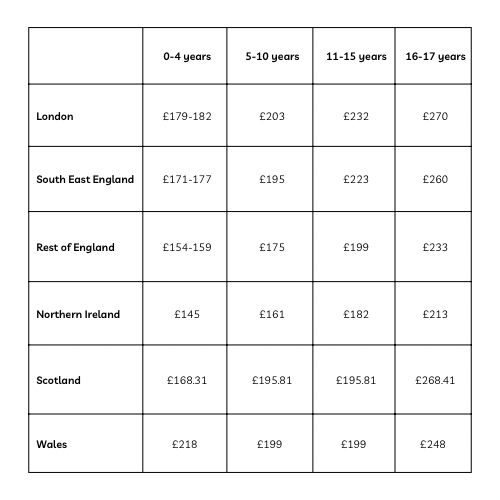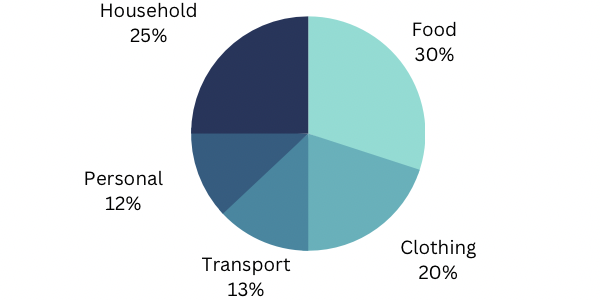
In this blog, we share some of the misconceptions about foster carer pay. We’ll give you the facts about how money really works in fostering.
We’ll answer your questions about money, that people are often afraid to ask.
Using foster carers and care experienced young people’s own words, we’ll answer 15 questions about foster carer pay.
here’s 15 myths, facts and reality about foster carer pay
- Can I ask about money?
- Do you get paid to foster?
- What is the money spent on?
- Why is it called an allowance?
- Travel expenses
- Discounts and free stuff for foster carers
- Holidays, birthdays, Christmas…
- Is a foster carer employed and paid a salary?
- Can I work and foster?
- Pocket Money and Savings
- Are all foster carers wealthy?
- Why are some carers paid more?
- Do foster carers get taxed on their payments?
- Will fostering affect my benefits
- Are foster carers “just in it for the money”?
can I ask about money?
Yes. Money might not be the first thing you think about with fostering. But it’s an important consideration. It’s part of how we support you to provide the best possible care for our children.
You need to understand the financial implications of fostering. As part of the assessment, your social worker will talk to you about your family income, outgoings and foster carer payments.
“we found it the most difficult question to ask. We didn’t know how it worked. I didn’t want people to think I was only interested in the money. But you need to know and understand what financial help you get.”
Local authority foster carer
do you get paid to foster?
Yes, you’ll receive financial support for every foster child in your care.
One part of the foster carer pay is often called an “allowance” and is usually calculated depending on the child’s age and the number of children you are caring for. This money should be spent on the child. This is usually around £200 a week for under 4’s up to £241 a week for over 16’s (in Wales).
Each government of the UK sets its national minimum or recommended allowance for foster carers according to the age and needs of a child.
The weekly National Minimum Allowance rates for each country are below:
Weekly 2023/4 allowances

Source : The Fostering Network
You may also receive a foster carers’ payment. This is often known as a “fee” or additional allowance.
This payment is for the foster carer and acknowledges the skills, training, time and commitment needed to care for our children. This may cover, for example, reducing your hours in work to do the school run.
For example, how much do foster carers get paid?
Jan is caring for a baby. She receives £200 a week. She uses this money to pay for nappies, formula, transport, clothes. Jan has been fostering for 4 years and also receives £100 per week fee payment.
Mike is fostering sisters age 10 and 12 year old long term. He receives £366 a week to cover the everyday costs of teenage clothes and after school clubs. Plus £177 a week fee payment.
More examples of UK foster carer pay

Foster carers receive financial support for every child they are caring for. Fostering payments are calculated weekly depending on the age and number of children you foster. Some foster carers also receive a fee payment for their time, commitment, knowledge and experience.
Get in touch with your local Foster Wales team to find out more
what is the money spent on?
Sometimes people comment that foster carers “earn” a lot of money. When we spoke to a group of foster carers and young people about this blog they all said the same thing…
“you need to explain what the money is spent on”
foster carer and care experienced young person
To break it down, the money given to foster carers goes towards:
- Child’s clothes
- Child’s food
- Household Bills
- Transportation
- Activities
- Pocket Money and Child’s savings
The financial support given to foster carers is to make sure our children have nice things, days out to adventure parks and new clothes.

“The money covers clothes (with every growth spurt) and after-school activities – from swimming lessons to martial arts. And it pays towards the extra fuel, food and a percentage of household bills. It covers aspects of everyday living including pocket money and putting something in his own little money jar each month.”
Foster Carer
why is it called a fostering allowance?
The “fostering allowance” is the regular amount of money paid directly into the foster carers’ account to go towards the day-to-day costs of caring for a child.
“you need to think about it as the child’s money.
Foster carer
The foster carer will then work out how they are going to budget for everything.
Foster carers don’t need to show or keep any records or receipts of what they’ve purchased or paid for with that money. The child’s social worker will regularly check that children have appropriate clothing and activities.
“people have strange ideas about the money. They think you just call up social services and they pay for everything for you. You live within your budget, within your means, we changed our spending habits and started things like meal planning.”
Foster Carer
Talk to your local foster wales team to find out more
travel expenses
There is a percentage of the fostering allowance to cover transport.
The everyday running around.
When you foster with the local authority, most of this ‘running around’ will be local. If you travel over and above that, you can claim mileage at a cost per mile.
“the child I care for has lots of contact with birth family so I travel a bit more”
Foster Carer
discounts and free stuff for foster carers
Many of our foster carers love to buy the children nice things and give them special treats. Especially when they’ve never experienced those things before.
“a pub lunch has been a real highlight for some of the children I’ve cared for.”
Foster Carer
As a local authority foster carer, you’ll receive a range of discounts and free entry at local venues to enjoy family days out.
We’ll help you to create new special memories for the children.
The fostering team enjoy sharing these moments with the children too – so we’ll organise special days out, paid for by the local authority, for all the whole fostering family to enjoy for free.
holidays, birthdays, Christmas…
Foster carers are also given money to be spent on holiday expenses. The holiday allowance is an amount of money which foster carers can decide how, when and on what they spend this on each year – from local day trips and ice-creams to caravan holidays or towards trips abroad.
“we love to take the children on holidays at the caravan. It’s our own freedom and space and not too restrictive for the children who may have not ever experienced a holiday at all. We have had a caravan the whole time we have fostered and many, many children have experienced happy times in West Wales”
Local authority foster carer
Foster carers also receive money to spend on special occasions such as birthdays and religious celebrations. The foster carer can decide what they buy within that allowance, to make sure our children have birthday parties or celebrations that they may never have experienced before.
Some foster carers receive this as a one off payment around the child’s birthday or Christmas and some foster carers have this element added onto their weekly allowance across the whole year.
is a foster carer employed and paid a salary?
Foster carers are extremely skilled and trained in working with children who have been through a lot. Foster carers should be treated as an equal member of the team around the child. However, the employment status of a foster carer is different.
“it’s not a 9-5 job, it’s a 24-7 way of life”
Foster Carer
As a foster carer, you are “approved” with a fostering service rather than employed. This means that there is a huge variety in the type of fostering that people do. The payment you receive will depend on how much and what type of fostering you do.
- Foster carers can increase or decrease the amount of fostering they do, alongside the ups and downs of family life.
- Fostering is a role that involves your whole family.
- Depending on the children needing care and your age preference, you might not foster continually for 12 months of the year.
- Foster carers can say ‘no’ to taking on a child (although it’s hard to do when you hear a young person needs somewhere to stay).
“our first call was a 14 year old and I said no. I felt bad. But when I spoke to my supervisor she made me feel totally comfortable about saying no. I was so tempted to say yes, but it had to be right for the whole family.”
Foster Carer

can I work and foster?
You can be a foster carer and work full time. If you want to foster but don’t want to give up your career, contacting your local authority would be the best choice. Some fostering agencies will encourage you to give up your job to foster. However, local authority fostering is flexible and varied.
“40% of foster carers combine their fostering role with other employment” .
The Fostering Network State of the Nation report 2021
Some local authority foster carers work, some foster carers are home during the day, some have foster children all the time, some reduce their working hours for the school run and some foster carers are retired. We have foster carers who are postmen, teachers, council staff, NHS managers, aircraft engineers, hairdressers…
Some things to consider:
- Your job could make you an important role model for a child.
- Your employer will be asked to provide a reference as part of your fostering assessment, so talk to them about becoming a foster carer
- If you already work with children, some of your training and experience will be transferrable.
- If you only foster babies and pre-school children, you (or someone in your family) will need to be at home with them.
- Some foster carers look after more than one young child
- Some parents foster alongside caring for their own young children at home.
“if you are going to give up work, you need to think about how you’ll manage your money. I work 2-3 shifts a week while he’s in school to be able to buy things like holidays and with Christmas coming up.”
Foster Carer
With any fostering/work balance, you’ll need to adapt some aspects of your life to make a difference to a child’s life. To attend training and meetings or do the school run and school holidays.
“as a single carer I couldn’t work in the summer holidays, you need a job that will fit”
Foster Carer
Read our blog: Can I work and be a foster carer
pocket money and savings
Having pocket money is good for children. It helps them learn how much things cost, how to save and how to manage their money when they are older.
Part of the fostering allowance covers an element of pocket money. (Most children are aware of this)
Children want to feel like part of the family, so often the same pocket money and expectations apply to all children in the household depending on their age.
“when foster carers give out pocket money, it should be fair.”
Care experienced young person
Many foster carers set aside part of the allowance and encourage young people to open a savings account.
The savings are in the child’s own name and go with them if they return home, move to different carers or when they reach adulthood. If the child has used some of their savings, foster carers should document and keep a copy of receipts to show where that money has gone.

are all foster carers wealthy?
You don’t have to be rich or have a big fancy house.
Just love them.
It’s not about the size of your house, it’s the warmth within the house, a home.
Contact your local authority fostering team
why are some carers paid more?
Fostering is many different things to different people. It’s not one size fits all, it’s very flexible. How one person describes fostering will depend on the child or children they are caring for, how much fostering they do and who they foster with.
If you foster with the local authority, you can build up your experience and skills in fostering, rather than jumping in at the deep end.Some fostering services offer a financial incentive as you gain knowledge and experience.
For some types of fostering, particularly children and young people who are not in full time school or need high levels of supervision, foster carers may need to be fully available and at home during the day. This type of fostering may provide a higher payment rate.
am I taxed on foster carer payments?
If the payment you receive from fostering is less than £37,640 per year (£18,140 + £375 per week per child under 10) or £41,540 (£18,140 + £450 per week per child aged 11+) then you may not have any tax to pay. (update:15/3/2023)
Foster carers are classed as self-employed. But don’t panic! The tax forms for fostering can be really simple.
Foster Carers have access to special tax rules and are entitled to a “Qualifying Care Relief”. So although you probably may not pay any tax on your fostering payments, you will still need to complete a tax form every year.
There are two methods; the simplified method which is far easier and you do not have to keep any receipts. And the profit and loss method, but you would need to keep all of your receipts and record your income and expenditure.
Some foster carers still choose to pay Class 2 National Insurance contributions, as this can affect your access to state benefits such as your state pension.
You can apply for NI credits or NI credits are automatic if you claim universal credit.
The Fostering Network offer expert advice and useful webinars and guides on foster carer tax.
will being a foster carer affect your benefits?
If you already claim benefits, whether this is Income Support, Working Tax Credit, Child Tax Credit, Housing Benefit, Income based Jobseeker’s Allowance or you’ve moved over to Universal Credit – any fostering payments will be disregarded as income.
If you claim Carers Allowance or DLA for your own child, fostering payments will also be disregarded as income.
Because fostering is classed as self-employment, you could still be entitled to working tax credit and child tax credit if you have children of your own.
Any new benefits claims would come under Universal Credit.
If you are a couple, then one person would be nominated a “lead carer” and although fostering income is disregarded, other household incomes such as partner’s income would have to be declared, and you cannot receive Universal credit if your capital (savings and investments) is above £16,000.
Benefits calculators – GOV.UK (www.gov.uk)
Your local foster wales team can advise you on your individual situation and help you understand what your financial situation would look like if you foster.
are foster carers “just in it for the money”?
Foster carer pay and money is a subject we don’t talk about very often. We know how it makes carers and care experienced young people feel.
“I’ve heard people talk about it as a money-making thing and it doesn’t make me feel nice at all. People assume you are earning loads”
Foster Carer
Children and care experienced young people are at the heart of everything we do. We spoke to a group of care experienced young people at Voices From Care Cymru before writing this blog and about how they feel about adverts for foster carers talking about earning money.
“Kids don’t want to be used for money”
Care experienced young person
One young person explained that you need a kindness in your heart, and not just be in it for the money. You’ve got to want to do it.
“good foster carers are the ones who care. And care less about the money.”
Care experienced young person
your next step
It is important that you understand the financial side of becoming a foster carer.
Your local Foster Wales team is here to answer all of your fostering questions, so please ask us how foster carer pay will work for you. We will explain the financial support you’ll receive and the type of fostering that’s right for you and your family.

I’ve worked in local authority fostering for over 17 years, meeting some of the most passionate people. Over the years I’ve learned from social workers with decades of experience who know the children, know their stories – and can tell you the children’s dates of birth off the top of their heads. And I’ve learned from real foster carers and been privileged to hear their stories and the stories of inspiring care experienced young people. I love what I do.
